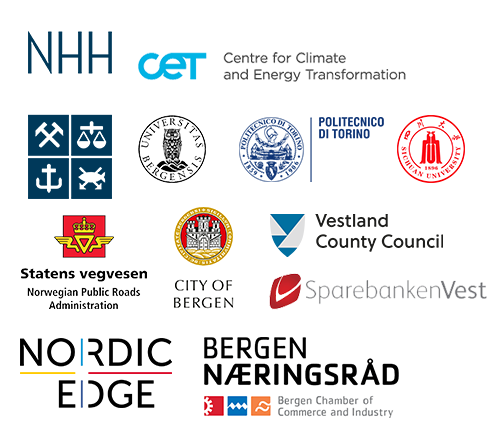NHH & CET unravelling the freight logistics tangle.
Urban population growth, internet shopping and demand for fast delivery services are increasing the amount of freight travelling through our cities. How we plan freight logistics is an important measure in creating sustainable cities.

Main content
The “Freight logistics in sustainable cities (CITYFREIGHT)” project explores the challenge of freight logistics in compact cities. CITYFREIGHT marks the start of an exciting new collaboration between the Norwegian School of Economics (NHH) and the Centre for Climate and Energy Transformation (CET) at the University of Bergen.
The official launch took place, like many other larger gatherings these days, on virtual meeting platform Zoom at the end of April. Despite not being able to meet in person, the launch successfully gathered the six user-partners, representatives from NHH & UiB and the Research Council of Norway.
The project is led by Prof. Stein W. Wallace, leader of the Centre for Shipping and Logistics at the Norwegian School of Economics (NHH) in close partnership with CET. CITYFREIGHT also brings new recruitment positions to CET. Both a PhD and Postdoctoral positions are now advertised with an application deadline of June 5th, 2020.
– Logistics is often an overlooked aspect of making cities more sustainable. Politicians tend to think about personal transport and private cars first. That’s why we thought a project on logistics could really make a difference" says CET Director Håvard Haarstad.
CITYFREIGHT looks at the challenges of urban population growth as a driving factor in the amount of freight passing through cities. Fewer people in urban areas are using cars when you combine this with an increase in internet shopping and population, and you get a substantial number of delivers. This puts pressure on urban areas, especially ones with compact city areas.
Project leader Stein W. Wallace explains how the City of Bergen is a suitable case for exploring these challenges:
– Most existing literature on freight logistics focuses on mega-cities. Our interest is smaller, often medieval, topologically complicated cities. We ask, for such cities, what are viable ways to regulate freight deliveries to achieve a sustainable city?
The primary objective of CITYFREIGHT is to provide authorities with a toolbox for realistically evaluating major decisions that make a city more energy-efficient and sustainable in.
– We use classical logistics tools, but with the purpose of advising authorities as to the effects of regulations, and not as a way to help companies handle regulations.“ Wallace elaborates.
Håvard Haarstad explains that CET’s role in the project will complement the logistics tools Wallace describes above.
– We will be looking at sustainable logistics from the side of society – what are the obstacles and barriers seen from decision-makers, planners and citizens. This will complement the modelling work by NHH, and make this an interdisciplinary project.
The project is a “knowledge-building project for industry” with a primary focus in outcomes that have high industrial and policy relevance. At the launch, Haarstad highlighted the importance of the user-partners in transformation research:
– I am excited about having so many user partners in this project. We want to engage with society when we do research, and here the relevant stakeholders are actually contributing to the project. They will have expectations about what we come up with, and that will keep us on our toes.
The user-partners and stakeholders involved in CITYFREIGHT are The Norwegian Public Roads Administration, Sparebanken Vest, City of Bergen, Vestland County, Bergen Chamber of Commerce and Industry, Nordic Edge AS and The Port of Bergen.
Many of the key stakeholders highlighted under the launch the important timing for this project. The last decade has seen an increased focus around decreasing emissions from personal transportation, whereas freight transportation has been challenging as it has a complicated regulatory system.
CITYFREIGHT is a Knowledge-building project for industry, funded through the EnergiX program at the Research Council of Norway and will run from 2020 – 2024.

